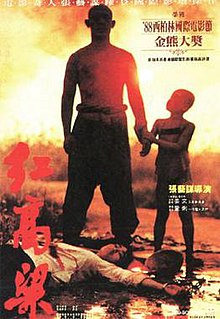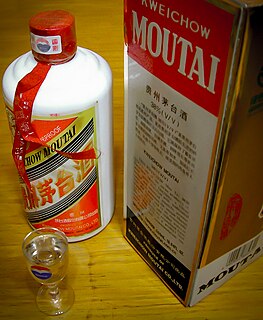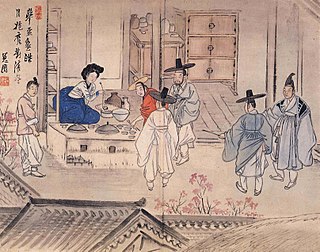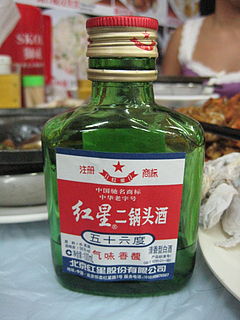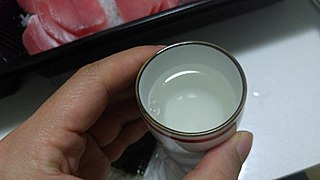This article needs additional citations for verification .(March 2013) (Learn how and when to remove this template message) |
| Kaoliang wine | |||||||||||||||||
| Simplified Chinese | 高粱 酒 | ||||||||||||||||
|---|---|---|---|---|---|---|---|---|---|---|---|---|---|---|---|---|---|
| Traditional Chinese | 高粱 酒 | ||||||||||||||||
| Literal meaning | sorghum liquor | ||||||||||||||||
| |||||||||||||||||
Kaoliang wine, Gaoliang wine or sorghum wine is a strong distilled liquor of Chinese origin made from fermented sorghum. It is a type of unflavoured baijiu. The liquor originates from Dazhigu (大直沽, located east of Tianjin), first appearing in the Ming Dynasty. It is now primarily made and sold in mainland China and Taiwan and also popular in Korea, where it is called goryangju (hangul: 고량주; hanja: 高粱酒) or bbaegal (which is originated from Chinese character 白干). [1] Kaoliang is an important product of the islands Kinmen and Matsu which are part of Taiwan. Kaoliang ranges usually between 38 and 63 percent alcohol by volume. At present, world’s highest alcohol content of kaoliang wine is up to 92%.

Liquor is an alcoholic drink produced by distillation of grains, fruit, or vegetables that have already gone through alcoholic fermentation. The distillation process purifies the liquid and removes diluting components like water, for the purpose of increasing its proportion of alcohol content. As liquors contain significantly more alcohol, they are considered "harder" – in North America, the term hard liquor is used to distinguish distilled alcoholic drinks from non-distilled ones.

Sorghum is a genus of flowering plants in the grass family Poaceae. Seventeen of the 25 species are native to Australia, with the range of some extending to Africa, Asia, Mesoamerica, and certain islands in the Indian and Pacific Oceans. One species is grown for grain, while many others are used as fodder plants, either cultivated in warm climates worldwide or naturalized, in pasture lands. Sorghum is in the subfamily Panicoideae and the tribe Andropogoneae.

Baijiu, also known as shaojiu, is a category of at least a dozen Chinese liquors made from grain. Báijiǔ literally means "white (clear) alcohol" or liquor.





